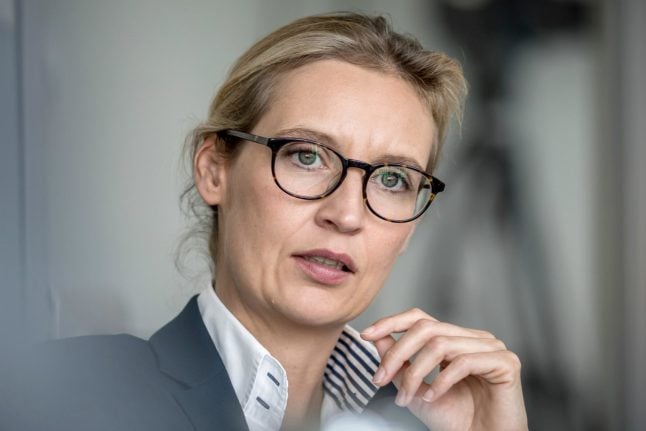“Following press reports, the public prosecutor's office of Lake Constance is examining whether there are indications for possible criminal acts,” a spokesman told Spiegel.
Prosecutors could not immediately be reached for comment when contacted by AFP.
German media at the weekend reported that the Lake Constance branch of the Alternative for Germany (AfD) party received a total of 18 donations from a Swiss pharmaceutical firm between July and September 2017, to the tune of 150,000 Swiss francs (around €130,000).
Under German law, campaign donations from non-EU countries are illegal.
The payments reportedly came with the message “campaign donation Alice Weidel”.
Lake Constance is the southern German district where top AfD figure Weidel was standing in the 2017 election, which saw huge gains for the anti-Islam, anti-immigrant party.
She is now co-leader of the AfD's parliamentary group. Weidel, who divides her time between Germany and Switzerland where her partner and children live, said she had no information about the campaign donor and stressed that the money was later repaid.
Nevertheless, politicians from other parties have been lining up to condemn her handling of the affair.
SEE ALSO: One year on from election, far right has transformed German politics
Lawmaker Britta Hasselmann from the opposition Greens accused Weidel of “playing the public for fools” by claiming she was unaware that foreign donations were illegal.
MP Johannes Kars of the Social Democrats, Chancellor Angela Merkel's junior coalition partner, said if the money is confirmed to have violated spending laws then Weidel “should resign”.
Anti-corruption group Transparency International urged Weidel to explain when exactly she learned of the “improper” payments and what action was taken.
The Bundestag federal parliament has also asked the AfD to explain the payments.
The Swiss company behind the donations told German media it was acting on behalf of “a business friend” but declined to name names.



 Please whitelist us to continue reading.
Please whitelist us to continue reading.
Member comments